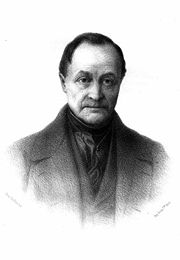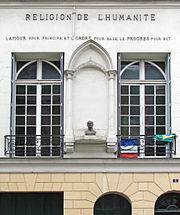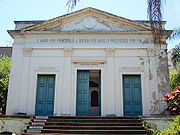- Religion of Humanity
-
Die Religion of Humanity (fr.: Religion de l'Humanité, pt.: Religião da Humanidade, hi.: मानवता धर्म) war eine von Auguste Comte (1798–1857), dem Begründer der positivistischen Philosophie geschaffene säkulare Religion. Anhänger dieser Religion erbauten „Tempel der Humanität“ in Frankreich und Brasilien. [1]
Inhaltsverzeichnis
Geschichte
Comte schuf die Religion of Humanity, um den Zusammenhalt (Kohäsion) positivistischer Gesellschaften zu stärken, als Alternative zu den Riten, Ritualen und Liturgien traditioneller Glaubensgemeinschaften, - und um seinen Welt- und Wertvorstellungen eine spirituelle Grundlage zu geben.
Im Jahre 1849 entwickelte er den Positivisten-Kalender und trat für eine Kalenderreform ein. Sein Kalender wird von den Anhängern der "Religion of Humanity" heute noch verwendet. [2]
Church of Humanity
Frankreich
Die Church of Humanity ist eine atheistische, positivistische Kirche, die auf dem Gedankengebäude der „Religion der Menschlichkeit“ fußt. Die Gemeinde in Comtes Heimatland Frankreich blieb klein, sie wurde jedoch inspiriert vom Aufstieg der Church of Humanity in England.
Großbritannien und Irland
Richard Congreve, Mitglied der London Positivist Society, war Mitbegründer der englischen Kirche im Jahre 1878. [3]
Obwohl an Mitgliedern verhältnismäßig klein, hatte die Kirche mehrere angesehene Mitglieder und Ehemalige. Anna Haycraft wurde mit den Gedanken der Church of Humanity groß, konvertierte jedoch später zum Katholizismus.
USA
Im Jahre 1854 wurde die New Yorker Gemeinde vom englischen Einwanderer Henry Edger gegründet, der sich einem „positiven Glauben“ widmen wollte.
Ab 1869 war David Goodman Croly ein leitendes Mitglied der Gemeinde. Croly glaubte stark an das religiöse Element des Comtismus, aber seine Missionsversuche scheiterten überwiegend. David Croly Sohn Herbert Croly (1869-1930) wurde im Sinne der Church of Humanity erzogen und in New York getauft. [4]
In den 1870er Jahren führte die positivistische Bewegung in den USA zu einer Abspaltung von der englischen Mutterkirche. Die US-amerikanische Kirche war weiterhin wie ihr englisches Vorbild atheistisch orientiert, führte jedoch Predigten, Lesungen aus dem Buch Jesaja und Sakramente in die Liturgie ein. Die amerikanische Gemeinde war nicht so bedeutend wie die Kirche in England, hatte aber mehrere gebildete Mitglieder. [5] [6] [7]
Brasilien
Am 11. Mai 1881 gründeten Miguel Lemos und Raimundo Teixeira Mendes die "Igreja Positivista do Brasil" in Rio de Janeiro.
Tempel der Humanität
- Chapelle de l’Humanité — 5 rue Payenne, Distrikt Marais, Paris
- Templo da Humanidade — Rua Benjamin Constant 74, Barrio de la Gloria, Rio de Janeiro, Brasilien
- Capela Positivista — Avenida João Pessoa 1058, Porto Alegre, Brasilien
- Capela Positivista — Rua Riachuelo 90, Curitiba, Brasilien
Bedeutende Mitglieder
- Anna Haycraft (1932–2005) war eine Englische Schriftstellerin und wurde mit den Gedanken der Church of Humanity groß, konvertierte jedoch später zum Katholizismus.
- Richard Congreve (1818–1899) war Mitbegründer der englischen Kirche im Jahre 1878
- Henry Edger war Gründer der New Yorker Gemeinde (1854)
- David Goodman Croly (1829–1889) war ein leitendes Mitglied der New Yorker Gemeinde ab 1869
- Herbert Croly (1869-1930) war Sohn von David Croly und wurde im Sinne der Church of Humanity erzogen und in New York getauft.
Bewertungen
- John Kells Ingram, ein Anhänger Comtes, widmete in seinem Gedichtband Sonnets and Other Poems das zweite Kapitel der "Religion of Humanity". [8]
- John Stuart Mill unterschied zwischen einem „Guten Comte“, dem Verfasser von The Course in Positive Philosophy und dem „Bösen Comte“, dem Begründer eines weltlich-religiösen „Systems“. [9]
Literatur
- Raquel Capurro - Le positivisme est un culte des morts: Auguste Comte -, Epel, 1998
- Walter Dussauze - Essai sur la religion d'après Auguste Comte -, L'Harmattan, 2007
- Henri de Lubac - Le Drame de l'Humanisme athée
- John Edwin McGee - A Crusade for Humanity: The History of Organized Positivism in England
- Allen C. Guelzo - For the Union of Evangelical Christendom: The Irony of the Reformed - (Kapitel 2)
- Denis G. Paz - Nineteenth-century English Religious Traditions: Retrospect and Prospect
- André Thérive - Clotilde de Vaux ou La déesse morte -, Albin Michel, 1957.
Siehe auch
- René Descartes
- Ludwig Feuerbach
- Fides et Ratio
- Geschichte der Soziologie
- Kult der Vernunft
- Rationalismus
- Rechtspositivismus
- Saint-Simonianismus
- Säkularer Humanismus
Weblinks
- Homepage von Denis Touret
- Homepage der Church of Humanity (Brasilien)
- Homepage der Chapelle de l'Humanité, Paris
Einzelnachweise
- ↑ Où peut-on visiter un temple positiviste?. Abgerufen am 3. Februar 2011.
- ↑ Homepage der Church of Humanity (Brasilien)
- ↑ Denis G. Paz: Nineteenth-century English Religious Traditions: Retrospect and Prospect
- ↑ New York Review of Books
- ↑ Allen C. Guelzo: For the Union of Evangelical Christendom - (Kapitel 2: "The Church of Humanity)
- ↑ New York Times: January 16, 1881
- ↑ The Church of Humanity: New York's Worshipping Positivists American Society of Church History
- ↑ John Kells Ingram - Sonnets and Other Poems (1900)
- ↑ Stanford Encyclopaedia: Auguste Comte
Kategorien:- Positivismus
- Religion
- Religionsphilosophie
- Religionssoziologie
- Freireligiöse, freigeistige und Freidenkerbewegung
- Weltanschauungsgemeinschaft
Wikimedia Foundation.



